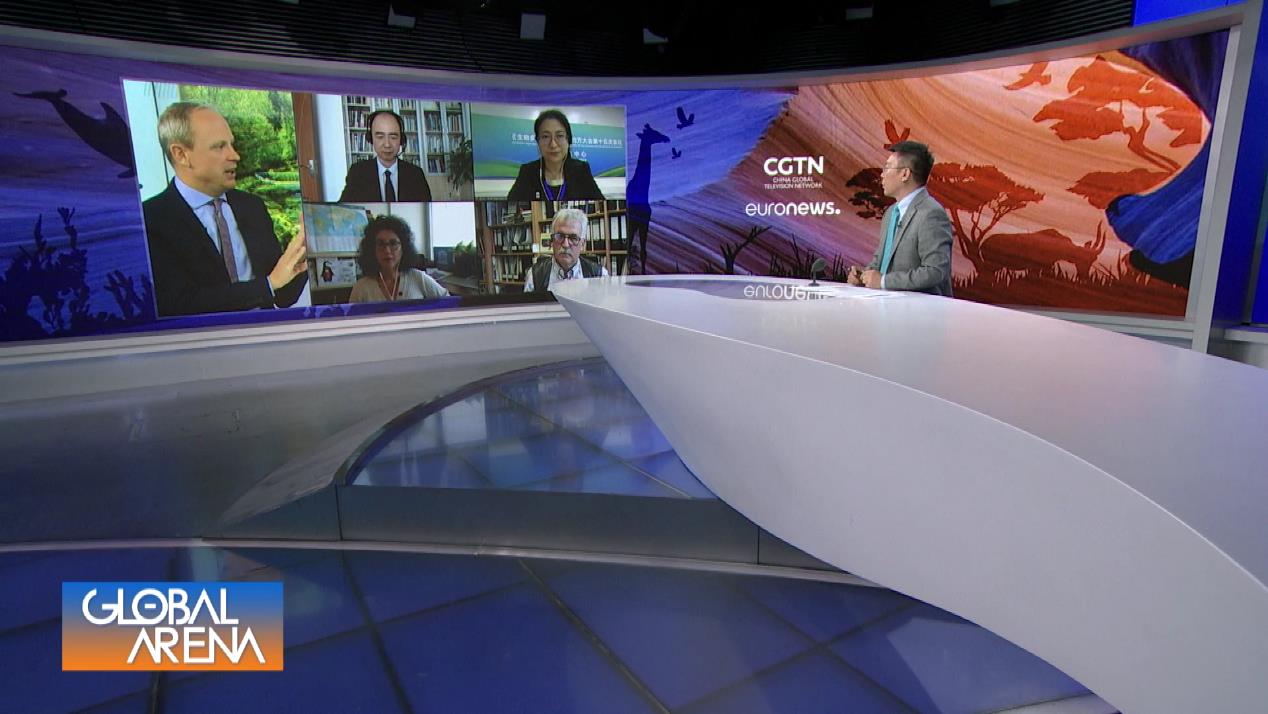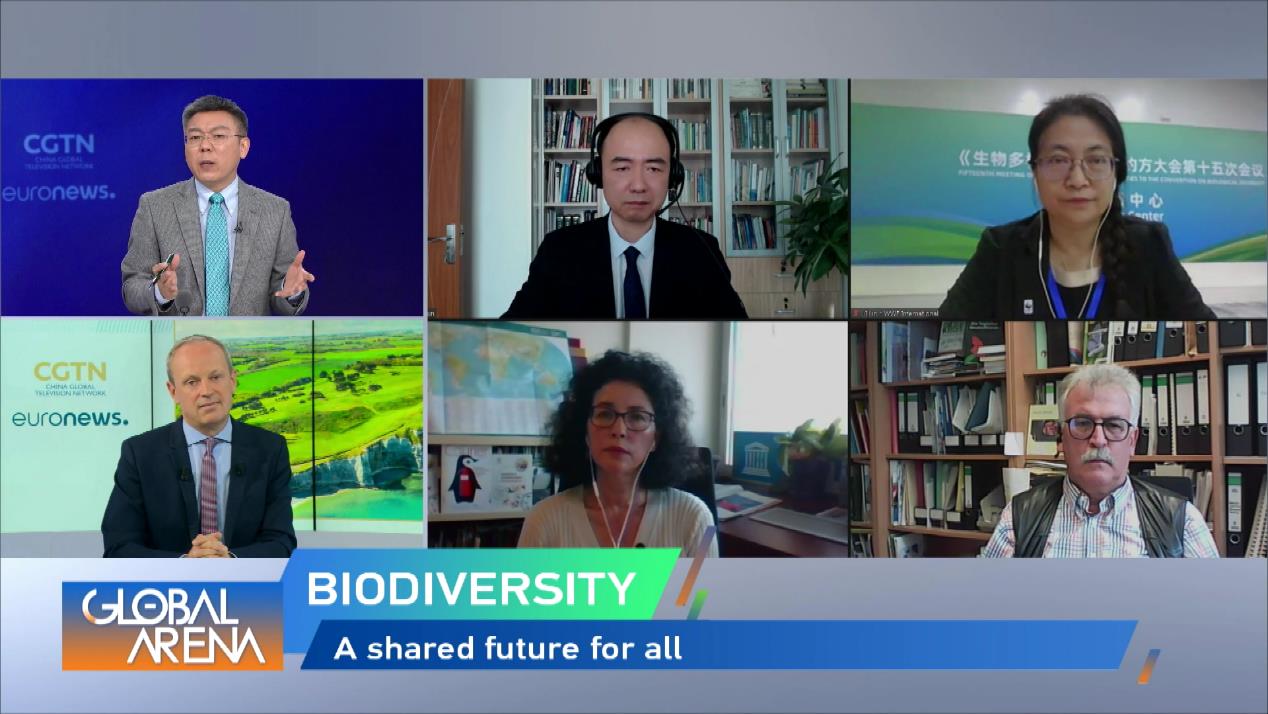01:30

Editor's Note: As the first part of the UN Biodiversity Conference, or COP15, was held in China's Kunming from October 11 to 15, 2021, CGTN's current affairs show "Dialogue" collaborated with Euronews to produce a special program "Biodiversity: A shared future for all," inviting renowned scientists and conservationists for a panel discussion on the urgent issue of how to protect, preserve and restore biodiversity on our planet.
A call for action
China, as one of the 17 recognized "megadiverse" countries in the world, has elevated biodiversity conservation to a national strategy.
"There is a hope and an opportunity," Meriem Bouamrane, head of the political and research section of ecology and biodiversity at UNESCO said at the TV forum.
"I think developing countries and non-developed countries like China, are taking action and are calling for action together," said Dr Li Lin, director of global policy and advocacy at WWF International.
"With nature loss threatening both human health and livelihoods, it is crucial that China, as COP president, takes the lead in encouraging all leaders to show the political will to reverse biodiversity loss and secure a nature-positive world by 2030," she said.
Biodiversity crisis
The world is suffering from catastrophic loss of biodiversity. The International Union for Conservation of Nature Red List of Threatened Species recently showed that 30 percent of the species it assessed face the threat of extinction – 79 species are extinct in the wild, 8,188 are critically endangered, over 14,106 are endangered, 15,186 are vulnerable and 7,889 are "near threatened."
Ma Jun, director of the Institute of Public and Environmental Affairs, believed these numbers showed that despite all the efforts made by the international community in reversing biodiversity loss, the world hasn't seen the turning point.
"Over the past 50 years, we have seen a massive development of humanity with the world population doubling and economy grew exponentially. But in the meantime, according to the Living Planet Report, we have seen around 60 percent of losses of the population of mammals, birds, reptiles," he said. "And according to the report, one million out of eight million species are facing the risk of extinction over the next few decades."
Extinction as part of evolution?
04:17

However, in spite of this devastating situation, some question whether or not humans should save endangered species. They argued extinction is part of evolution and mass extinctions that come every 50 to 100 million years periodically wipe out 75 to 95 percent of all species straight away.
Meriem Bouamrane believed that humans have a reason to care.
"Life is including death. We see the different cycle of nature, so this is part of natural extinctions," she admitted. "But what is new and alarming is its accelerating process like never before."
"The reports from Science, from the Intergovernmental Panel on Climate Change, have clearly demonstrated that terrestrial ecosystems are altered because of human activities. For example, in Europe, (we saw) fires and floods, proven to be induced by human activities and the way we live on earth and we manage the ecosystem. Humans are responsible for what is happening. Humans can and should fix it," Bouamrane said.
Nature's future, our future
In spite of all those difficulties, speakers at the forum agreed the world has made some significant progress in reversing biodiversity loss and there's still hope for better recovery.
In July, China announced that giant pandas are no longer endangered as its wild population has almost doubled, thanks to 30 years of government-led recovery efforts. Another example is Asian elephants. China's Yunnan has seen its elephant population nearly doubled over the last three decades to about 300.
"I think it's important to say that conservation works. Humans can help to reintroduce some species that were disappearing," said Meriem Bouamrane. "These are success stories we should build on. We should follow and implement scientific recommendation."
"But now the real issue is that biodiversity is not only focusing on species. It's all about interactions: interactions between the genetic diversity and the species and the ecosystem that we humans are able to manage. (It's time) to really change and transform our habits or way of living on earth, and to live in harmony with nature, including in urban cities. We should be able to live in harmony with nature, not only in protected area," she added.
Josef Settele, global assessment author for the IPCC of Biodiversity, argued the importance of maintaining the balance between conservation and restoration.
"We're trying to do lots of restoration, but we have to be careful not to forget conservation in this context. So not to lose the things that they are already just to restore things that are lost already. That's quite important to have both. Priority is a conserving system and then going to restoration," he said.
Part Two of COP15 will take place in Kunming in April to May next year, and will feature the adoption of the new Global Biodiversity Framework, which will replace the expired Aichi Biodiversity Targets. Dr Li Lin expressed her optimism towards the outcomes of the meetings.
"The past couple years we observed, at this moment, there're 92 head of states, including EU, they have made leaders pledge for nature last year. And they renewed their commitment this year. 72 countries formed a High Ambition Coalition, calling for conserving 30 percent of land and ocean on the planet. And there's global ocean line, with 31 countries joining, to protect 30 percent of the ocean. All of those countries adding together, there are 100 countries which represent 42 percent of global GDP and 31 percent of global population community to really make transforming changes to conserve the future," said Dr Li Lin.
"We also see business. More than thousands of businesses are coming to call for the governments to really taking seriously of nature. And they are willing to do that. Adding to that, the awareness and actions of the general population are also changing," she added.
"People are ready. We need to really use the COP15, use this Global Biodiversity Framework, maybe one in the millennium opportunity, to really put our commitment (and) action under the decision, so that all countries can go back to implement. I see hope," said Dr Li Lin.
"Dialogue" is a prime time daily English talk show on CGTN. The 30-minute talk show covers a wide range of domestic and international topics, providing a balanced and critical perspective on current affairs and analysis within the framework of cross-cultural and multi-disciplinary comparisons. This is a special collaboration by "Dialogue" and Euronews, a French-based pan-European television news network, headquartered in Lyon, France. Euronews began broadcasting on January 1, 1993, with the aim of covering world news from a European perspective.
(If you want to contribute and have specific expertise, please contact us at opinions@cgtn.com.)

